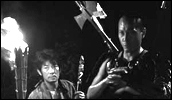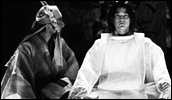Gojoe
- Year
- 2000
- Original title
- Gojo Reisenki
- Japanese title
- 五条霊戦記
- Alternative title
- Gojoe: Spirit War Chronicles
- Director
- Cast
- Running time
- 137 minutes
- Published
- 24 July 2001



by Tom Mes
A sumptuous and at times super-charged swordplay fantasy, Gojoe puts the spin on one of Japan's most popular feudal legends: the battle at Kyoto's Gojoe Bridge. Though its multitude of characters and warring factions might make Gojoe somewhat confusing to Western eyes, the basic storyline is simple: warriors of the Heike clan get their heads chopped off by an invisible force at Gojoe bridge. Benkei, a former Buddhist monk plagued by the demons of his own past, sets out to destroy the evil force that lurks at Gojoe, aided by his graverobbing sidekick Tetsukichi. They soon discover that the perpetrator is in fact a young warrior, a former lord named Shanao, out for revenge against the clan that ordered the death of his family.
The fact that Sogo Ishii, the creator of such contemporary punk masterpieces as Burst City (Bakuretsu Toshi, 1982) and Crazy Thunder Road (Kuruizaki Sandaa Rodo, 1980) is at the helm should be an indication that this is not your average swords-and-kimonos adventure. Gojoe plays less like a jidai geki than a true Ishii film in period garb. Elements and themes from his films from the 1990s - spiritualism, the metaphysical, man being a small but essential part of the greater cosmic scheme - are combined with a resurgence of the boundless energy of his work from the 80s.
This energy is particularly apparent in the many action scenes. Although these were choreographed by Peking Opera alumnus Zhang Chun Xiang, along with Hirofumi Nakase, the result is different from your average Hong Kong swordplay film. In Hong Kong martial arts cinema, action is aesthetic, the human body and its movements accentuated to the point of fetishism. Ishii doesn't portray action scenes for their beauty, but for their power - to emphasise slaughter by numbers in the tradition of the chanbara genre. This makes them more brutal, but sometimes less engaging. Seeing Tadanobu Asano slashing his way through a horde of Heike warriors in full battle dress is fun for a while, but grows a bit stale when repeated too often or stretched out too long.
In the version of the film that was initially re-edited for foreign distribution, this becomes painfully clear. Figuring non-Japanese wouldn't understand the period detail, 40 minutes of essential exposition on character's motivations and background information were cut from the film, essentially reducing Gojoe to a pointless, 91-minute action scene. (The film as subsequently released on DVD in the US and UK was, however, the full-length version)
But it's the details and nuances that give the film its strength. As a genre piece, the film is like a breath of fresh air, adding much-needed nuance to the overly conformist jidai geki. It doesn't present feudal Japan as a land of only samurai and peasants, but breaks with the tradition of Kurosawa and Mizoguchi by portraying rebel guerillas, hermits, thieves, warrior monks, and a single mother.
Its main characters are wonderfully defined, the relationship between Benkei and his aide in particular. Tetsukichi is a sceptic, a man who lives in the here-and-now, who doesn't care for his fellow men (he scavenges armour and swords off samurai corpses) and cares even less for the beliefs and the spiritualism of his companion. In lesser hands, his character would have been a source for bumbling comic relief, but Ishii's direction and a remarkably naturalistic and down-to-earth performance from Nagase make him human. Inevitably, he changes thanks to his involvement with Benkei's quest and opens his mind to the existence of a higher power. It's ironic then, that they discover that the force they have set out to destroy is not of supernatural origin at all, but human - a master swordfighter driven by revenge, one of the most earthly of motivations. In fact Shanao is violently anti-spiritual and his anger against the Heike clan soon grows into an all-out hatred of religion and idolatry. Irony befalls him too, since the man who has come to destroy him is a monk.
All in all, Gojoe, with its roaring monster of a finale and brilliant score (partially by Ishii's own band Mach 1.67 which also provided the deafening soundtrack to Gojoe's companion piece Electric Dragon 80,000 V), is a refreshing re-invention of one of the stalwart genres in Japanese cinema, exhilarating and breathtakingly photographed.